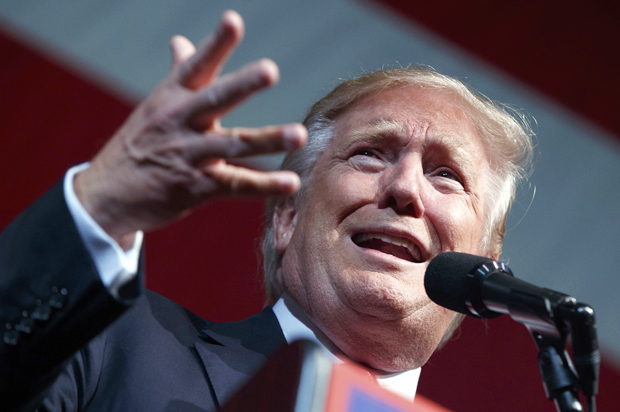Donald Trump’s campaign to debase himself and the party he represents continues to break new ground and find massive success. His latest innovation, which you’ve almost certainly heard about by now, was his remark during a speech this week that “Second Amendment people” might do something in response to President Hillary Clinton nominating judges. Trump and his people are energetically trying to spin his remarks as a plea to gun rights activists to organize and get out the vote in November, but that spin is belied both by Trump’s own words and the disorganized response from his surrogates. The Republican presidential candidate floated the possibility of a violent response to his rival’s election, and in doing so he made a pointed attack on the legitimacy of our political system.
Democracies retain their legitimacy by means of a compromise between opposing political factions: in basic terms, electoral losers consent to their defeat, while the winners “lament” the fact that victory comes with limitations to their power. Obviously it’s not a trade-off that leaves everyone happy, but it provides the bedrock of legitimacy for an elected regime and reinforces the idea that the proper means for transferring political power is through democratic elections.
Trump’s “Second Amendment” remark erodes both components of that trade-off. The premise he set up for his audience involved President Hillary Clinton behaving in a dictatorial or tyrannical fashion: “Hillary wants to abolish — essentially abolish the Second Amendment,” Trump said. “If she gets to pick her judges, nothing you can do, folks.” Clinton has never said or proposed anything that can be credibly construed as a desire to “abolish the Second Amendment,” but here Trump has her doing exactly that, abusing her power and doing it in a way that leaves his supporters powerless. Having set up Clinton as a power-mad tyrant, he tosses out the anti-democratic remedy: “If she gets to pick her judges, nothing you can do, folks. Although the Second Amendment people, maybe there is. I don’t know.”
The situation Trump sketched out here represents a complete breakdown of political legitimacy. The first half – a tyrannical Hillary Clinton in office – he presents as a certainty. The second half – violence as a means to resolve to a political dispute – he offers as a possible outcome. And this remark follows a series of comments from Trump and his surrogates pre-emptively questioning the integrity of the coming general election and hinting at violence in the (extremely likely) event of a Trump loss.
It’s important to point out that Trump’s comments didn’t come from nothing. Republicans and the conservative movement have spent the past eight years trying to erode the political legitimacy of the twice-elected Democratic president. The campaign has taken various forms – from the fringe movement challenging Barack Obama’s citizenship by birth to the ongoing Senate Republican obstruction of Supreme Court nominee Merrick Garland – but the common thread has been the persistent undermining of political norms to try and prevent a politician from the other party from exercising the powers of his office.
His suggestion of gun violence as a remedy to government tyranny isn’t especially novel either. Republican senator Joni Ernst of Iowa used to tell gun groups that she carries firearms for self-defense, “whether it’s from an intruder, or whether it’s from the government, should they decide that my rights are no longer important.” Ted Cruz got into a fight with Lindsey Graham during the GOP primary after the Texas senator sent a fundraising email describing firearms as “the ultimate check against governmental tyranny.” High-profile Republican politicians allied themselves with low-rent insurrectionist Cliven Bundy during his armed standoff with federal officials over a cattle grazing dispute. Trump’s appeal to “Second Amendment people” was itself a callback to Nevada Senate candidate Sharron Angle’s invocation of “Second Amendment remedies” to “the Harry Reid problems.”
What makes Trump distinct from the rest of these people is that he has no real investment in the political system and no real understanding of how it is supposed to work. That ignorance and lack of buy-in makes him a uniquely dangerous force, given that he feels no need to consider the potential long-term impacts of what he says. He’s running this campaign for himself, and it’s in his immediate interest to encourage his supporters to doubt the legitimacy of elections and think about the need to commit violence as a response to the routine workings of American democracy.


